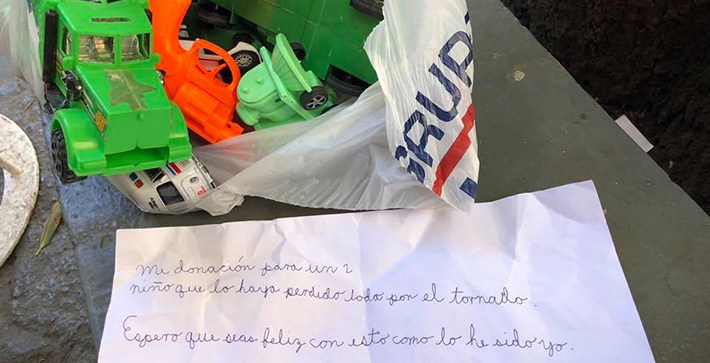 Donated toys found with note from a child for tornado victims.
Donated toys found with note from a child for tornado victims.
The tornado and the new Cuba that takes shape
HAVANA – January 27, 2019, marked a before and after moment regarding important issues that concern Cubans. For a group of persons living in Havana, it was one of the saddest nights of their lives. The misfortune brought about by a tornado, and its wake of destruction, death and pain, have been the trigger for an endless tide of people from all backgrounds who have felt obliged to help their countrymen.
A little over a week has passed since the sad event, and much has changed forever.
That many Cubans took pity on their affected countrymen, and expressed pain and sympathy with those affected, is nothing new. What has happily surprised most everyone has been the scale, the spontaneity, the organization, the agility and the integrality with which many inhabitants of the capital, and others from other provinces and even other countries have mobilized effectively to help. In many cases using social networks from mobile phones, to channel aid that, although we do not have all the details, has already gone from a symbolic act to real support that makes a difference for those who have to deal with such a disaster.
The fact that the response has come from all social groups and has generated a contagious effect surpassing any event of this type in memory is very moving.
When so many of us allowed ourselves to be dragged into endless conversations about ‘lost’ or ‘changed’ values in our youth, their actions these days confirm that Cuba has an infinite capital of humanity ready to be activated when necessary.
The moral and civic reach of our citizens is praiseworthy. Spontaneous participation has exceeded all expectations. And this time, the great majority has turned out without being “summoned.” The demands for transparency in the handling of donations and the proliferation of analyzes of the situation and the response provided constitute evidence of the maturity of a new type of civil society.
It is also good to know that there are ‘islands’ of excellence within our troubled economy. Cuban electric lineworkers have become so masterful at their craft that I can attest that they have attracted attention beyond our borders. Noteworthy too is the promptness with which services such as fixed telephony, and to a lesser extent, the water supply, have been restored. The urgency and social pressure have forced us to innovate and design instant solutions to address exceptional situations such as this.
Social networks have become a key instrument for mobilization and information. We have seen hundreds of Cubans becoming the storytellers. The chronicles have caused tears, which have pushed many to act. Internet via the mobile phone, a service that has just recently started, has demonstrated its binding power. It has been a factor for citizen empowerment, both helping to coordinate the response and to oversee government management, while also helping to denounce inappropriate occurrences.
There are also lessons to be learned. In some cases, very regrettable lessons. The plans and the infrastructure for such help was not up to the standard needed to adequately channel this overflow of citizen action. From the government, inertia brought delay when it came to recognizing the legitimacy of the actions that citizens were taking. Procedures on how to act were not ready, and have been created on the fly, with the frustration that it creates on those who want to do more and make things better. Observers agree that the government has been agile with traditional mechanisms, but slow to address unknown circumstances.
It is a wake-up call. What we are seeing is the clash between two paradigms: the current one, whereby government was the only actor in the provision of aid and protection in cases of catastrophe; and the one that’s emerging, in which diverse non-state actors have the means and vocation to provide this type of assistance. The speed of change for official institutions has caused vertigo. And this should not be seen as a challenge, or a threat. Cuba has changed, and certain frameworks are already too narrow.
The tragedy has also contributed to bring light on many hidden vulnerabilities that Cubans have lived with for too long. The tornado crossed some of the most humble areas of five municipalities of the capital city. Areas that contained the weakest dwellings.
And we can’t continue to skip over the obvious. The issue of housing is of prime importance, and there is no lasting solution with a stagnant economy. Many resources and new ways of doing things are required. An event of this nature is not foreseeable; the impact is severe but very localized. But it is obvious that the quality of the response depends, to a large extent, on the availability of resources and the living conditions in the affected areas. Political will is important, but not enough to solve all the problems on the ground.
Generating resources to alleviate and eventually provide a lasting solution to those affected will take time and depends on processes that go beyond this particular situation. What can be reviewed immediately is the approach to dealing with phenomena of this nature. There are also lessons that can be extrapolated for other changes underway in our country. The Cuban government must leave behind the notion that it is the only legitimate actor, and should welcome help from the new society that emerges. Right now let us embrace the wake of solidarity that the tornado has left.


